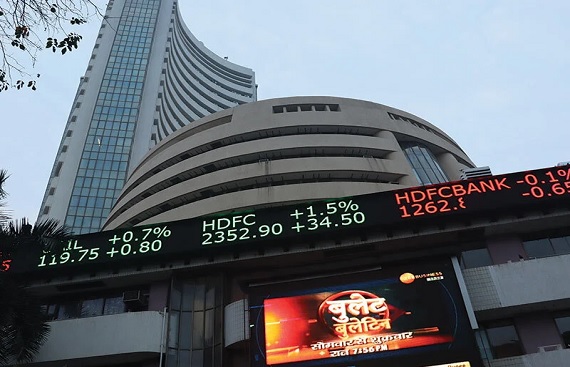India Surpasses Hong Kong, Becomes Fourth-Largest Stock Market
By
siliconindia | Tuesday, 23 January 2024, 10:05:40 AM IST

For the first time, India's stock market has surpassed Hong Kong's, marking another achievement for the South Asian nation. The combined value of shares listed on Indian exchanges reached $4.33 trillion as of Monday's closing, surpassing Hong Kong's $4.29 trillion, according to compiled data. This positions India as the world's fourth-largest equity market. India achieved the milestone of crossing $4 trillion in stock market capitalization on December 5, with nearly half of this growth occurring in the past four years. The country's growth prospects and policy reforms have contributed to making it an attractive destination for investors.
The surge in Indian equities can be attributed to a swiftly expanding retail investor community and robust corporate earnings. As the world's most populous nation, India has emerged as a viable alternative to China, drawing new investments from both global investors and companies. This is due to its stable political environment and a consumption-driven economy that continues to be one of the fastest-growing among major nations. “India has all the right ingredients in place to set the growth momentum further", said Ashish Gupta, chief investment officer at Axis Mutual Fund in Mumbai.
The relentless rally in Indian stocks has coincided with a historic slump in Hong Kong, where some of China’s most influential and innovative firms are listed. Beijing’s stringent anti-COVID-19 curbs, regulatory crackdowns on corporations, a property-sector crisis and geopolitical tensions with the West have all combined to erode China’s appeal as the world’s growth engine. They have also triggered an equities rout that’s now reaching epic proportions, with the total market value of Chinese and Hong Kong stocks having tumbled by more than $6 trillion since their peaks in 2021. New listings have dried up in Hong Kong, with the Asian financial hub losing its status as one of the world’s busiest venues for initial public offerings.
However, some strategists expect a turnaround. UBS Group AG sees Chinese stocks outperforming Indian peers in 2024 as battered valuations in the former suggest significant upside potential once sentiment turns, while the latter is at “fairly extreme levels", according to a November report. Bernstein expects the Chinese market to recover and recommends taking profits on Indian stocks, which it sees as expensive, according to a note earlier this month.
The negativity surrounding China and Hong Kong has intensified in the new year due to the absence of significant economic stimulus measures. The Hang Seng China Enterprises Index, which reflects Chinese shares on the Hong Kong stock exchange, has already declined by approximately 13%, following a record four-year losing streak in 2023. The index is approaching its lowest point in nearly two decades, contrasting with India's stock benchmarks, which are currently hovering close to record highs.
Investors who were previously captivated by the China story are now redirecting their funds toward its South Asian counterpart. A study by the London-based think-tank Official Monetary and Financial Institutions Forum reveals that global pension and sovereign wealth managers are showing a preference for India. In 2023, foreign funds infused over $21 billion into Indian shares, contributing to the eighth consecutive year of gains for the country's benchmark S&P BSE Sensex Index. “There is a clear consensus that India is the best long-term investment opportunity", Goldman Sachs Group Inc strategists including Guillaume Jaisson and Peter Oppenheimer wrote in a note on January 16 with the results of a survey from the firm’s Global Strategy Conference.
Read More News :
Today's watchlist: Zee, Cipla, MRPL, Axis Bank, Media Assist, and JSW Group stocks
EAM Jaishankar Emphasizes Cooperation in Energy and Mobility in Nigeria Visit

.jpg)

